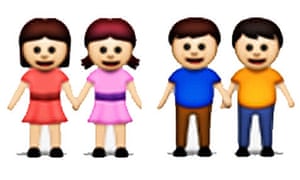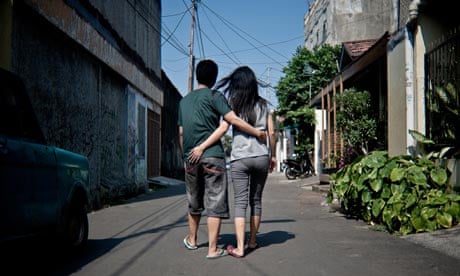Human Rights Watch expresses alarm as government says social media must respect ‘culture and local wisdom of the country’
Indonesia has ordered messaging apps to stop using same-sex emoji. Photograph: Google
Associated Press in Jakarta
Indonesia’s instant messaging providers must remove gay emoji and stickers from their apps, the government has ordered, prompting a human rights outcry.
The government move comes after a social media backlash against Line, a popular smartphone messaging app, for having stickers – an elaborate type of emoji – with homosexual themes in its online store.
Homosexuality and is not illegal in Indonesia but LGBT matters are a sensitive issue. At the same time most of Indonesian society, which follows a moderate form of Islam, is tolerant, with gay and transsexual entertainers often appearing on television shows.
But Twitter and Facebook recently exploded with criticism of Line and its competitor WhatsApp for containing gay content.
Line on Tuesday said it had removed all LGBT-related stickers from its local store after complaints from Indonesian users.
Ismail Cawidu, a spokesman for the government’s communication ministry, said the government would tell WhatsApp, owned by Facebook, to do the same as Line.
“Social media must respect the culture and local wisdom of the country where they have large numbers of users,” he said.
Indonesia's transgender couples surrounded by fear and persecution
Read more
Human Rights Watch called on President Jokowi Widodo to protect gay and lesbian rights after his government’s latest high-profile step to discourage visible homosexuality.
In a letter to the president, HRW said the government should publicly condemn officials who make “grossly discriminatory remarks” against lesbian, gay, bisexual and transgender people.
“President Jokowi should urgently condemn anti-LGBT remarks by officials before such rhetoric opens the door to more abuses,” said Graeme Reid, LGBT rights director at Human Rights Watch. “The president has long championed pluralism and diversity. This is an opportunity to demonstrate his commitment.”
Advertisement
In January the higher education minister Muhammad Nasir said openly gay students should be banned from the University of Indonesia’s campuses. His statements followed controversy over news a sexuality research centre planned to offer counselling services for students.
Nasir’s statement sparked public controversy in Indonesia for weeks, with objections from human rights groups but support from the Indonesian Ulema Council, an influential board of Muslims clerics.
Gay rights advocate King Oey urged the government to respect international treaties signed by Indonesia protecting the rights of minorities and women.
“Gays and lesbians are not illegal in Indonesia,” Oey said. “We urge people who are concerned with human rights to not sit by silently.”
In 2014 lawmakers in Aceh, a conservative Indonesian province, passed a law that punishes gay sex by public caning and subjects non-Muslims to the region’s strict interpretation of Islamic sharia law.
In October 2015 sharia police in Aceh arrested a pair of young women for “hugging in public”.





0 Σχόλια